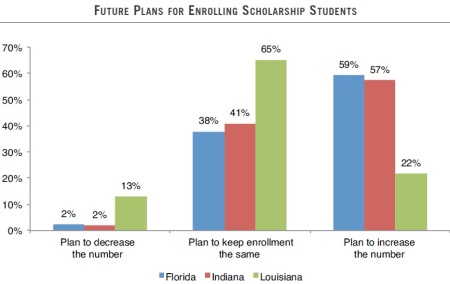
(Guest Post by Matthew Ladner)
The Kisida, Wolf and Rhinesmith survey of attitudes of private school leaders in Florida, Indiana and Louisiana released today by AEI has a ton of important information. I commend the authors for releasing it, as the data gathered reveals the cost of attempting to regulate private schools participating in private choice programs.
In particular, the evidence seems to point in the direction of requiring schools to give a test tied to the state curriculum, requiring a great deal of paperwork, and only making low-income students from the lowest performing school eligible represents creates a powerful incentive for schools not to participate. In other words, Louisiana should examine the results of this study carefully and make some significant adjustments if they would like more of the 70 percent of private schools that chose not to participate to make seats available. Let’s just go ahead and put it on the table that the 30 percent of participating schools likely have financially desperate organizations over-represented, and the 70% of non-participants probably have higher percentages of stable organizations and high quality seats.
One of the charts deals with schools already participating in the choice- notice the enthusiasm for increasing participation in reasonably regulated Florida as opposed to the disinterest in Louisiana. A net 55% of Florida participating schools plan to increase participation, against 8% in Louisiana.
Florida does make provision for standardized testing, but allows schools to choose their own test. Florida law has an ongoing third-party academic evaluation of the trends in scores for the program. Indiana also mandates state testing, but had effectively done so years before the creation of the choice program. Every state has varying levels of regulation and laws that apply to private schools irrespective of whether or not they have a choice program, meaning that the impact of a heavy-handed will vary from state to state based on this and other factors.
The authors also surveyed non-participating schools. Let’s look at the gory details from Florida and Louisiana. First Florida:
Take a look at the fourth item down from the top. Ok- now Louisiana:
So 23 percent of Florida non-participating schools said that concerns about independence, character and identify played a major role in their decision to keep out of the program, whereas 46% of Louisiana schools said it played a major role. Eleven percent of Florida schools said it played a minor role, whereas an additional 26% of Louisiana schools said the same. Overall 72% of Louisiana non-participants expressed concerns about their independence under the program.
Notice the first item as well- Florida private school leaders seem relatively confident that Florida lawmakers won’t go off the deep end in the future. Louisiana private school leaders seem to think that their lawmakers have already gone off the deep end. Most Florida private schools participate in the choice program, and seem anxious to provide more seats for low-income students. Many Louisiana private school leaders meanwhile have (understandably) adopted the stance of “thanks but no thanks.”
We create these programs in order to expand opportunities for students. Policymakers must carefully balance the public’s interest in academic transparency with the interest in private schools in maintaining their distinctive character and independence. Opinions of this subject are diverse, but far too many in my view have been consumed with a simplistic notion that giving the state’s (often subpar) test somehow equates with “accountability.” The word means being held responsible, but there is a whole bunch of state testing going on, but precious few being held responsible for much. Private schools already commonly use tests like the Stanford 10 and Iowa Test of Basic Skills and I’ve yet to see anyone make a convincing case that these tests won’t do just fine in providing transparency without saddling private schools with a state mandated curriculum.
Just as a quick thought experiment, suppose every state in the union ditched their state test (some of which are decent and some of which may as well be He-Man and the Masters of the Universe coloring books) and replaced it with one of the national norm tests. How would “accountability” be diminished? If you have a coherent answer please leave it in the comments. If you have an undying irrational attachment to the eternal beauty and truth of state tests uber alles, don’t bother unless you can explain why.
I know a few of the decision makers in Louisiana, and can attest that the road to this hell was paved with good intentions. No one woke up in the morning, stretched and yawned, and said “I want to create a choice program for disadvantaged kids that 70% of the private schools in the state won’t touch with a ten-foot pole.” That is not at all what happened, but the end result has been the same.
You live and learn- it is time to learn.




State tests are essentially He-Man coloring books? No wonder they’re always complaining the tests privilege white males!
I propose replacing the He-Man tests with Thundarr.
How about the Herculoids? Remember Gloop and Gleep? What about that weird alien triceratops looking thing that could shoot exploding rocks out of its horn?
This may be an unfair jab at Louisiana, but when I first read the quote about some private schools not wanting to participate in that state’s choice programs because of a desire to “maintain their distinctive character and independence,” I was skeptical. How much do unspoken racial attitudes play in these decisions? Hope I’m wrong.
I think it’s safe to say that race plays a role in both Florida and Louisiana in both public and private schools.
Racial segregation in public schools is epidemic and impossible to change, because the district boundaries are drawn for the purpose of racial segregation and it’s basically impossible to change them:
School choice improves racial integration by breaking down the relationship between residence and school:
http://www.edchoice.org/Research/Reports/Freedom-from-Racial-Barriers–The-Empirical-Evidence-on-Vouchers-and-Segregation.aspx
I agree with both Jay and Greg.
Matt,
Brilliant interpretation of the study. I tweetered it.
Thanks Kid!
[…] I should have looked at this post by Matt Ladner first. He largely makes the same point, but with a little more zing at […]
[…] educational choice laws allow very wide participation and eschew technocratic regulations that can impede or even undermine their […]
[…] educational choice laws allow very wide participation and eschew technocratic regulations that can impede or even undermine their […]